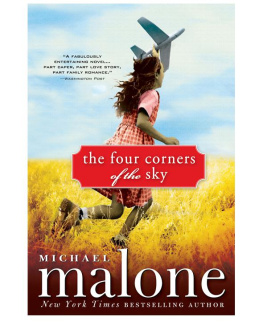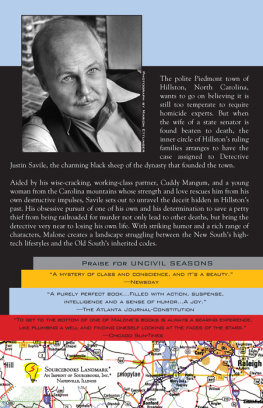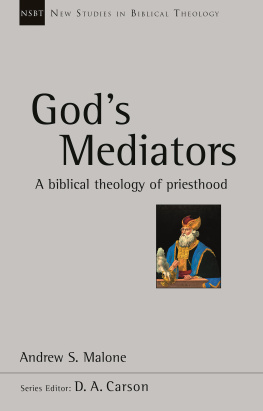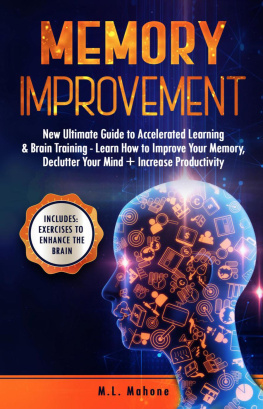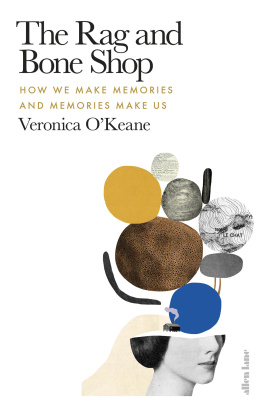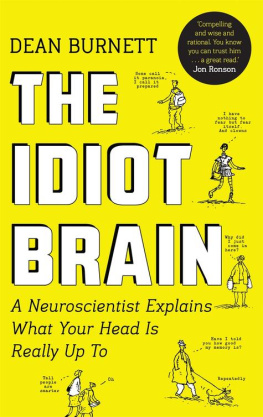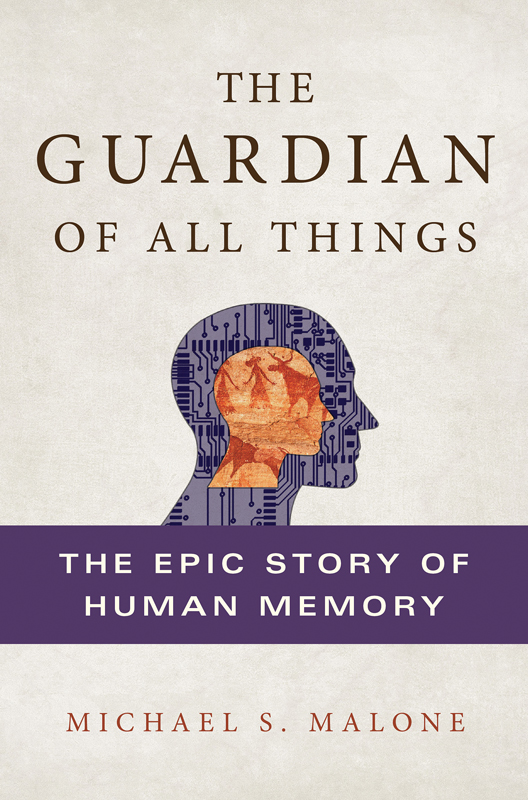
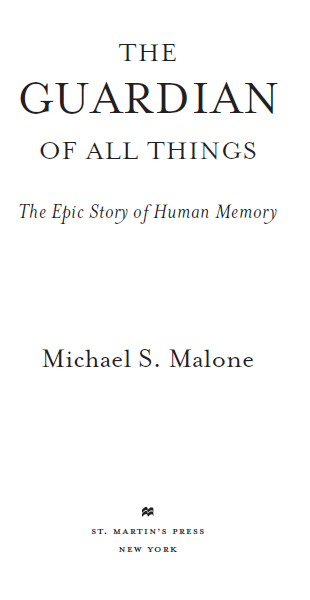
The author and publisher have provided this e-book to you for your personal use only. You may not make this e-book publicly available in any way. Copyright infringement is against the law. If you believe the copy of this e-book you are reading infringes on the authors copyright, please notify the publisher at: us.macmillanusa.com/piracy.
Contents
Introduction:
Memory as Biography
Memory as Word
Memory as Symbol
Memory as Medium
Memory as Metaphor
Memory as Classification
Memory as Reference
Memory as Instruction
Memory as Recording
Memory as Free
Memory as Existence
Introduction
The Guardian of All Things
Memory as Biography
Memoria est thesaurus omnium rerum e custos.
Memory is the treasury and guardian of all things.
MARCUS TULLIUS CICERO
I first conceived of writing about the story of memory more than thirty years ago, as the result of two experiences in my early adulthood.
I joined the San Jose Mercury News as a daily technology reporterprobably the first in the worldin late 1979. It was a thrilling beat: Silicon Valley was in its first great flowering, and other than a few trade reporters, I had it all to myself. I covered the last great days of Hewlett-Packard and the first few years of Apple. I interviewed all of the soon-legendary first generation of Valley entrepreneurs, from the men who founded the semiconductor industry to the builders of the first personal computers, disk drives, and video games.
I felt myself (accurately, as it turned out) to be uniquely positioned to watch up close the most important story of my time as it unfolded. And as I raced around the Valley and did my interviews and wrote my stories I learned two things. One was that even in as scientific and empirical an industry as high tech, the real story was always elusive and the official histories were rarely correct.
But it was the other thing I learned that eventually led me to write this book. Wherever I went in those days, I was told how lucky I was to be covering Silicon Valley at that moment. That the current efflorescence of new companies and new products would be a brief one. And that the glory days were already coming to an end.
Why? Memory , they told me. Chips and processors are getting faster and more powerful by the year. But they are solid-state; they need only be miniaturized; their path is clear. But memory, I was told, is a different story: Chip memory cant keep up the pace, and magnetic memory is all about spinning disks and moving heads and motors. Disk memory is a machine with moving parts; itll never keep pace with logic chips and microprocessors.
And yet as the years passed, almost magically, memory kept up. Somehow, the engineers and scientists who worked in memory always found a way to progress each of the technologiessemiconductor, magnetic, optical, and odd little experimental designs like magnetic bubblesand always managed to keep up. Sometimes these companies, despite often being in competition with one another, seem to work togetherlike rugby players making their way downfield, flinging lateral passes from one company or industry to the next always making forward progress, and always staying just ahead of the other guys.
It struck me then, and I still believe, that these memory folks were the great unsung heroes of the electronics age. While others enjoyed the limelight and the glory for their achievements, those who toiled in the memory businesson whom all of the others depended for survivaldid so (with the rare exception of an Al Shugart) in the shadows of near-anonymity. I resolved then to tell their story.
The second experience was the death of my father.
My dad was a remarkable character: tough, brilliant, and a hero. When he died at sixty-seven, he had lived what for most men would have been a couple lives. He had survived swallowing razors in a carnival sideshow, murderous hobos riding the rails, thirty missions as a bombardier in a B-17 over Europe, gun battles as a spy in Germany and North Africa, encephalitis, car crashes, a Tibetan earthquake, and three heart attacks. And in the end, what killed him was that most common domestic injury of middle-aged men: He fell off a ladder and fractured his skull.
He didnt die quickly; he was too tough for that. Instead he lingered, in a semicoma, as his wife and adult children visited him each day in the intensive-care ward of the county hospital.
It was on one of those days when my wife and I visited him that we were met in the entryway to the ward by one of the doctors. Your father, he told me, is doing the most unusual thing. We cant figure it out. Would you watch him for a while and tell us what you think it is?
I pulled a chair up next to my fathers bed and leaned close. At first, he looked as he did on all of the other days: stretched out in his slightly tilted hospital bed, a bank of monitors beside him, and an oxygen mask on his face. But something had changed: Instead of lying quiet and still, my fathers eyes were open and unfocused. His left hand, all but immobile until now, had crept up above the top of the blanket, and his fingers were tapping the air. And beneath his oxygen mask, I could see my dads lips moving, as if he were speaking in a crisp and systematic way.
I leaned over and put my ear to his cheek. I could see his fingers still tapping the air just in front of me.
I heard the doctors voice behind me. Do you know what hes doing?
I stood up and turned around. Yes. I believe hes going through the preflight checklist for a B-17 bomber. The oxygen mask must have set off a memory. See his fingers? I think hes flipping toggles and switches and tapping gauges.
Really, said the doctor. Amazing. And he walked away.
I watched my father. Somehow, a half-century later, it was all still thereevery step, every reading, and every switch to flip. Im certain that even he didnt know he remembered. After all, he had washed out of pilot schoolthats why he became a bombardier and navigator. So his time in the pilots seat must have been a brief one. And yet, that had been enough to imprint the memory of an incredibly complex experience, at age twenty-two, into my fathers brain until the day he died. What else was in there? Was everything in thereall of the memories of a lifetime? And were they in all of us?
I have always been haunted by what I saw in my father that day. Losing him was painful enoughbut the realization that his whole lifetime of memories, still present, might have been lost as well added to the heartbreak. And in the years since, Ive followed the latest discoveries in the cognitive sciences and neuroscience, stories of prodigious feats of human memory, and the growing body of work in brain implants and brain-machine interconnections. All of them hinted, as did my father that day, of something vast and awesome hidden just beyond our reach. So did watching my two boys, as babies, as they seemed to grab the entire world with their minds.
My own career has been a busy one, not least the writing of a small shelf full of books bearing my name as author. Through it all, I never gave up on my plan to write the story of memory, both human and artificial, and how they interact to make us who we are. Several times over the years I proposed the book to publishers only to have them (figuratively) yawn at the prospect of a dreary tome about disk drives, and counterpropose some other book idea (How about a book about Apple?). About a decade ago, I bounced the idea back and forth with the BBCs former NASA reporter and legendary science historian James Burke (author of Connections ), an old friend. But our plans went nowherethough his readable style and sense of fun is something Ive aspired to in this book.



